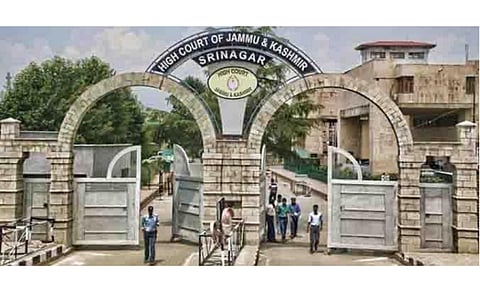

JAMMU: In a landmark ruling, the High Court of Jammu & Kashmir and Ladakh has reaffirmed the sanctity of property rights, delivering a significant victory for citizens in the case of Sudhir Kumar versus UT J&K [WP(C) No. 832/2022].
The case revolves around the alleged unlawful occupation of land by the government entities and the petitioners’ quest for justice.
Justice Sanjay Dhar, presiding over the J&K High Court bench, issued a verdict that resonates with the foundational principles of property rights enshrined in the Constitution of India.
The court unequivocally stated that the state cannot invoke the doctrine of adverse possession to deprive citizens of their rightful ownership of land. This principle, upheld by various legal precedents, emphasizes the fundamental nature of property rights and underscores the judiciary’s role in safeguarding them.
The crux of the dispute lies in the alleged takeover of the petitioners’ land by the government departments, including the Jal Shakti Vibagh PHE Division of Nowshera and Public Works Department (PWD) in Rajouri district, among others.
The petitioners contend that despite being recorded as rightful owners in revenue records and having their inheritance attested, their land has been occupied without due process or compensation since 1963. This assertion of ownership gained further traction following the mutation of inheritance in their favor in 2013.
In response, the government departments contested the petitioners’ claims, asserting their own purported rights to the land dating back to as early as 1959. However, the court found significant discrepancies in the respondents’ assertions, highlighting the lack of concrete evidence supporting their claims.
Despite referencing entries in revenue records and alleging transactions, the respondents failed to provide substantiating documentation or clarity on the purported acquisitions.
The court’s scrutiny extended to the question of the petitioners’ right to claim compensation decades after the alleged unlawful occupation. Drawing from legal precedent, the court emphasized that the delay in seeking recourse does not diminish the inherent right to property.
This underscores the enduring nature of property rights as essential pillars of democratic governance, protected under both the erstwhile Jammu and Kashmir state laws and the Constitution of India.
Ultimately, the court ruled in favor of the petitioners, affirming their rightful ownership of the land and ordering compensation for the unlawful occupation by the government entities.
The ruling directs the concerned departments to initiate the acquisition process promptly, adhering to relevant land acquisition laws. Furthermore, it mandates the payment of rental compensation to the petitioners for the duration of occupation until the land is returned.
This verdict sets a significant precedent in upholding property rights and ensuring accountability in land acquisition processes. It underscores the judiciary’s commitment to protecting citizens’ rights against arbitrary state actions and reinforces the foundational principles of justice and democracy.
Have you liked the news article?